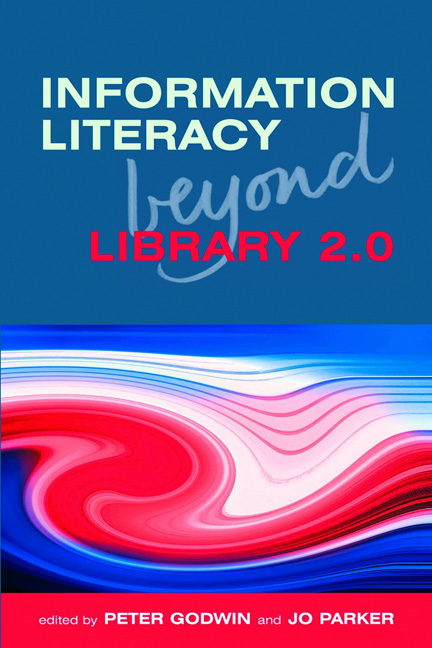Book contents
- Frontmatter
- Contents
- Contributors
- Acknowledgements
- Introduction
- PART 1 RECENT DEVELOPMENTS IN INFORMATION LITERACY AND LIBRARY 2.0
- PART 2 CASE STUDIES
- PART 3 WHAT IT MEANS FOR INFORMATION PROFESSIONALS
- 18 Helping the public online: Web 2.0 in UK public libraries
- 19 Change has arrived at an iSchool library near you
- 20 Information literacy: a path to the future
- 21 Thoughts about the future
- 22 Last word: information literacy beyond Library 2.0
- Index
18 - Helping the public online: Web 2.0 in UK public libraries
from PART 3 - WHAT IT MEANS FOR INFORMATION PROFESSIONALS
Published online by Cambridge University Press: 09 June 2018
- Frontmatter
- Contents
- Contributors
- Acknowledgements
- Introduction
- PART 1 RECENT DEVELOPMENTS IN INFORMATION LITERACY AND LIBRARY 2.0
- PART 2 CASE STUDIES
- PART 3 WHAT IT MEANS FOR INFORMATION PROFESSIONALS
- 18 Helping the public online: Web 2.0 in UK public libraries
- 19 Change has arrived at an iSchool library near you
- 20 Information literacy: a path to the future
- 21 Thoughts about the future
- 22 Last word: information literacy beyond Library 2.0
- Index
Summary
Background
As I write, public libraries in the UK are going through a period of change possibly unparalleled in their 200-year history. The economic situation is causing major cuts to public library budgets across the board. In addition to the usual wave of cuts to services, stock funds and opening hours, a growing number of authorities are passing the running of branch libraries to local community groups, commonly to parish councils. Along with the pressure to reduce budgets, another associated driver of change is about meeting the requirements of the UK government's policy initiative called the Big Society, which is encouraging local authorities to engage more with local communities in the management and delivery of services. A third driver of change is the more subtle force of customer demand: there are some indications that online use of public libraries is rising to match physical use, as more and more people use the internet to access the library services outlined below.
All three of these factors are leading to an increasing interest in Web 2.0. Its characteristics of potential for access to and by huge user groups, opportunities to engage with communities through social networks, and user-generated content mean that it offers some useful tools for improving productivity and achieving Big Society engagement with services.
A key dilemma that public libraries are facing, as I write, is the mismatch between what customers expect to be able to do with library services online and what local authorities – the organizations that run public libraries – allow libraries to do. The most common complaint amongst public librarians is about restrictive policies – the biggest barrier to greater engagement with the public. The majority of local authorities ban their staff from using social media and this ban severely restricts both staff's understanding of the technologies and their use of them to interact with customers. However, there are signs that these restrictions are loosening up: there has been an influential report from SOCITM (2010), and some very useful work done by the Local Government Improvement and Development agency (LGID). The LGID runs the Communities of Practice for Public Service website, ‘a community platform supporting professional social networks across the public sector’, many of which cover social media, and which many local government officers have joined.
- Type
- Chapter
- Information
- Information Literacy Beyond Library 2.0 , pp. 205 - 214Publisher: FacetPrint publication year: 2012



